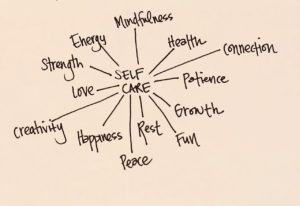
When I say ‘self-care,’ what’s the first thing that comes to mind? Is it a bubble bath, shopping trip, indulgence in food or drink, massages, or manicure? In reality, it’s much less glamorous.
Self-care is simple and usually doesn’t cost a cent. It is both easy to do and easy not to do. In times of uncertainty, looking after our well-being is the best time investment.
Routine, routine, routine!
Keep a daily or weekly routine with planned activities. Even adults thrive in routine. This is especially important during times of isolation or quarantine. Make a chart to break down the day or week with tasks or activities you would like to complete. Schedule in your shower, lunch, reading a book, taking a walk, gardening, cleaning the bathroom (I know, I know… who wants to clean their bathroom on a good day?), or a video date with your family.
Sleep hygiene
Sleep has a major impact on overall well-being and mood. Quality over quantity! If you struggle to fall asleep, here are six tips for maintaining healthy sleep hygiene:
- Shut off electronics one hour before bed
- Go to bed at the same time every night
- Follow a bedtime routine
- Limit your day naps
- Exercise during the day
- Get some sunshine!
Journal
Write it out! The good, the bad, and the ugly. Journaling is an excellent way to let your worries out to keep them from becoming overwhelming or consuming. It doesn’t have to be fancy or perfect. It doesn’t even have to be neat and tidy. You don’t even have to go back and reread what you’ve written. This is the process of just dumping the thoughts, worries and feelings somewhere to help you process them.
What you can control
When life is uncertain, it’s easy to be consumed with what we can’t control. Try to focus on what you can control. Some examples of things you can control:
- Your routine at home
- What time you wake up in the morning
- What you eat
- Getting outside
- Your use of social media.
- Identify the things you can’t control and let them go. Examples of things you can’t control (but you need to let go of):
- Trying to predict the future
- What others are or aren’t doing
- Whether or not there is going to be toilet paper at the grocery store.
Avoid toxic social media and news
Limit time on social media and watching news. While it’s important to stay informed, avoid becoming overloaded with information. This can contribute to feelings of anxiety and depression.
Mindfulness
I encourage everyone to make time for mindfulness every day. Mindfulness means taking time to focus on the present moment. For some, it might be drinking your coffee silently in the morning, savouring the taste, and noticing the heat against your lips as you drink it. For others, it could be walking along the beach and noticing the feel of the sand between your toes and the cool breeze on your face.
There are many different mindfulness exercises, including meditation, deep breathing, progressive muscle relaxation, noticing with your five senses, etc. Free apps, like Insight Timer, have free live events, 5-minute to 20-minute guided meditations, and mini-courses you can take to improve your mindfulness skills.
 RSS Feed
RSS Feed